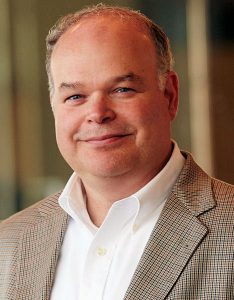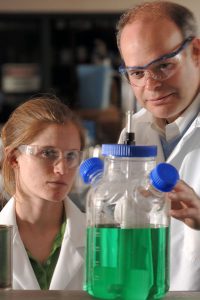
Daniel Zitomer, Marquette University (Milwaukee) environmental engineering professor, is a 2017 WEF Fellow. Photo courtesy of Zitomer.
To his students, colleagues, and community, Marquette University (Milwaukee) environmental engineering professor Daniel Zitomer has been a fixture of the Wisconsin water environment profession for more than two decades.
Zitomer, a member of the Water Environment Federation (WEF; Alexandria, Va.) and the Central States Water Environment Association (CSWEA) for nearly 30 consecutive years, was named a 2017 WEF Fellows program honoree. The program celebrates exceptional contributions to the water and wastewater profession by WEF members.
An accomplished educator
Zitomer built his career around mentoring the next generation of water professionals. During his tenure at the university, Zitomer has instructed courses in chemistry, industrial waste management, wastewater facility design, and environmental engineering. Since 2003, he has served as director of Marquette’s Water Quality Center.
“Dan picked up the torch that was the environmental engineering program at Marquette University in 1995 and in 20 years has converted it into a growing program that is nationally visible,” said Patrick McNamara, an assistant professor in Marquette’s environmental engineering department. “He has mentored a tremendous amount of students and you would be hard-pressed to find a consulting engineering company office in Milwaukee that does not have an engineer educated by Dan.”
In 1999, Zitomer developed an international engineering service program at Marquette that later became the university’s student chapter of the global humanitarian group, Engineers Without Borders (Denver). As part of his Latin American Health, Infrastructure, and Environment course that he regularly instructs, Zitomer has led countless student groups to Guatemala and El Salvador to improve the infrastructure of remote communities.
Zitomer also has received WEF’s Gordon Maskew Fair Distinguished Engineering Educator Medal in 2008; and the CSWEA Bill Boyle Educator of the Year award in 2015.
An industry changemaker
As an author of more than 50 peer-reviewed research papers and book chapters, Zitomer’s influence on wastewater treatment professionals spans much further than the students he teaches.

From right, Zitomer conducts research in the laboratory with former Marquette University student Anne Schauer, who is co-founder of Mango Materials (San Francisco). Photo courtesy of Marquette University.
Zitomer regularly works with various private industries, including soda bottlers, cheese companies, and paper manufacturers, to help them better manage and pre-treat industrial waste streams. As a consultant, he has helped local industries save money while easing burdens on water resource recovery facilities (WRRFs) and the environment.
WRRFs in Wisconsin also have experienced positive change through Zitomer’s influence. He patented an anaerobic treatment bioaugmentation process that has led to treatment-train improvements in local municipalities.
While working on his doctoral degree, Zitomer conducted a study that found bacteria used in anaerobic digestion produces the compound methanethiol as a response to stress. This finding led to many using methanethiol as a monitoring tool for the health of anaerobic digesters.
A rich water legacy
“There are many people who inspired me to enter the water sector,” Zitomer said. “When I look back, I think first of my father, Kenneth Zitomer, who was chief engineer, chief of design, and chief of construction for the Philadelphia Water Department and a member of WEF who really inspired me to think about the environment and protecting water.”
Twenty years ago, wastewater managers measured success by how much wastewater they could process safely. Today, the focus has broadened to include objectives like resource recovery, energy recovery, and sustainability, Zitomer said. And he expects another sector transformation to occur soon, he said.
“My advice for the next generation of water professionals is to always be rooted in the basics and always be flexible … Know that everything’s going to change in probably six years,” Zitomer said.
— Justin Jacques, WEF Highlights
Follow WEF Fellows’ Stories in WEF HighlightsThe Water Environment Federation (WEF; Alexandria, Va.) Fellows program recognizes the professional achievements and contributions WEF members have made to the preservation and enhancement of the global water environment in practice areas served by the organization. In 2017, WEF bestowed this honor on 11 individuals. See a video featuring interviews of the 2017 WEF Fellows. Each of these recipients will be featured in future issues of WEF Highlights. Follow these stories with the keyword WEFFellows17. |








March 30, 2018
Featured